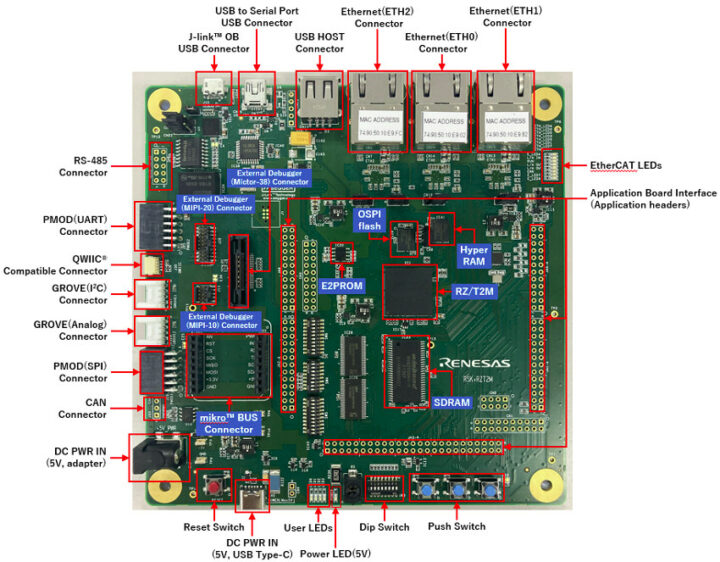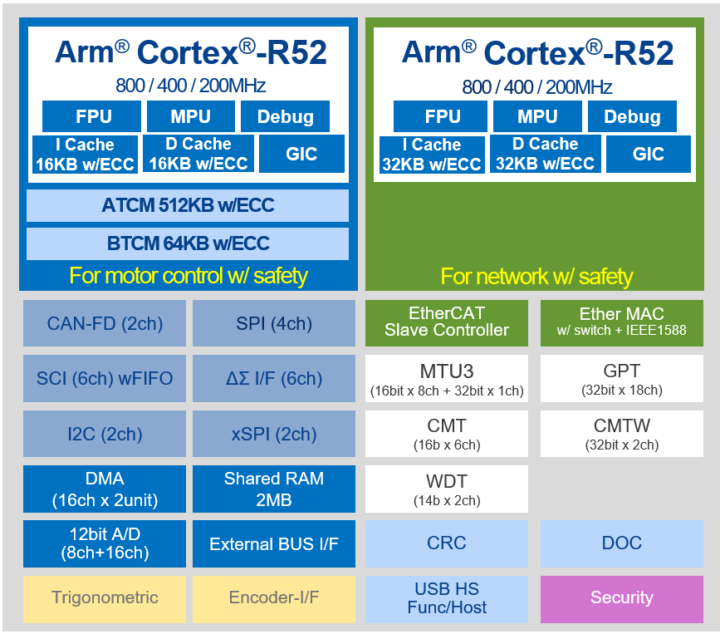Built around two Arm Cortex-R52 cores clocked at up to 800 MHz, Renesas RZ/T2M microprocessor units (MPUs) target real-time, high-precision motor control applications such as AC servo drives and industrial robots.
The RZ/T2M microprocessor also supports Ethernet with TSN and functional safety, and has been designed in such a way to reduce the number of external components in order to both decrease the BoM costs and the product size.
Renesas RZ/T2M key features and specifications:
- CPU – Up to 2x Arm Cortex-R52 cores clocked at up to 800MHz, one core for motor control, and the other for networking
- Trigonometric function accelerator
- Memory – Tightly coupled memory 576KB with ECC, 2MB RAM with ECC
- Storage I/F – Octa/Quad SPI support
- Networking
- 3-port Gigabit Ethernet switch with TSN
- Industrial Ethernet: EtherCAT, PROFINET RT/IRT, EtherNet/IP, etc…
- Motor control
- 2-channel encoder interface with support for A-format, EnDat, BiSS, HIPERFACE DSL, Tamagawa
- Functional safety support up to SIL3
- Motor current loop < 1µs
- 3-phase complementary PWM output for dual motor control
- 6-channel ΔΣ I/F
- Other I/Os
- 2x 12-bit ADC
- USB – 1x USB 2.0 high-speed host/functions
- 2x CAN FD (compliant with ISO11898-1)
- 6x SCI with 16-byte transmission and reception FIFOs
- 3x I2C, 4x SPI, 2x xSPI
- Voltages – Core 1.1V, I/O 3.3/1.8V
- Packages – 320-pin BGA, 225-pin BGA, 176-pin QFP, 128-pin QFP
- Temperature Range – -40 to +125°C
The Renesas RZ/T2M microprocessor can be programmed with the Eclipse-based e² studio IDE or IAR Embedded Workbench for Arm, and a “Flexible Software Package” (FSP) is also provided.

The company can also provide the Renesas Starter Kit+ for RZ/T2M (RZ/T2M-RSK) evaluation and development kit with the following highlights:
- MPU – Renesas RZ/T2M MPU, 320-pin package (R9A07G075M24GBG)
- System Memory – 256 Mbit SDRAM, 64 Mbit HyperRAM
- Storage – 256 Mbit NOR Flash, 512Mbit Octa Flash, 5Mbit QSPI flash, 16Kbit I2C EEPROM
- Networking – 3x Gigabit Ethernet port
- USB – 1x USB Host port
- Serial – RS485, CAN connector
- Expansion – Pmod, Groven QWIIC, mikroBUS
- Debugging – On-board emulator circuit (J-Link), USB to TTL connector
- Power Supply – 5V via DC jack
The kit also includes all necessary cables to get started.
The Renesas TZ/T2M MPUs and evaluation kit are available now with the latter going for about $440 US. More details, including extensive documentation and purchase links, can be found on the product page.
Thanks to TLS for the tip.

Jean-Luc started CNX Software in 2010 as a part-time endeavor, before quitting his job as a software engineering manager, and starting to write daily news, and reviews full time later in 2011.
Support CNX Software! Donate via cryptocurrencies, become a Patron on Patreon, or purchase goods on Amazon or Aliexpress





